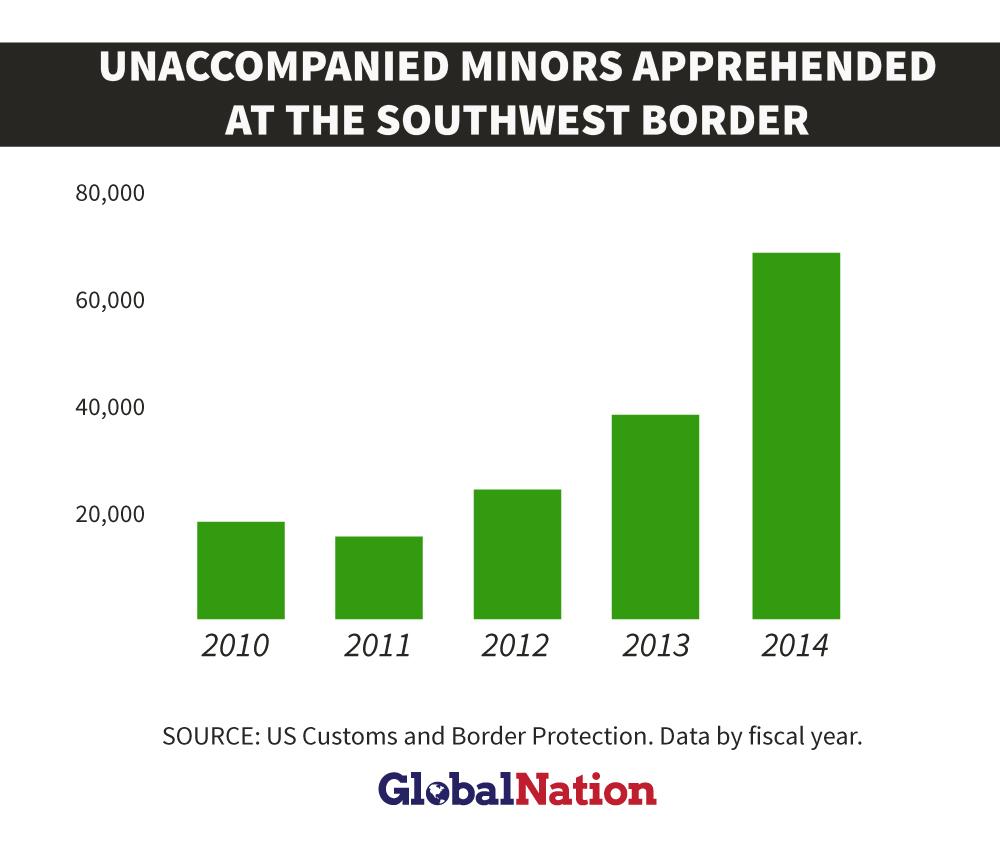Without lawyers, 90% of children crossing into the US alone seeking safety could be sent back
68,541 children traveling without parents were apprehended along the southwest US border from October 2013 through the end of September. It’s a staggering number. In comparison, the US Border Patrol reported apprehending just 18,411 unaccompanied minors in 2010.
It’s not only a logistical challenge along the border, however. Many of these young people will apply for asylum in the US based on gang persecution in Central America. It's an increasingly common argument by those seeking refugee status, and is a major test of our immigration system.

Molly Castillo-Keefe of the Immigrant Children’s Protection Project in Chicago coordinates legal visits and refugee orientations while working with shelters to represent children seeking asylum. She says she has seen firsthand, after living in Nicaragua for 10 years and working in the region, the pervasiveness of violence in some parts of Central America. But what should the US do about the children trying to escape?
Castillo-Keefe answered your questions about children who cross the border alone on Facebook this week. Here is an edited version of what she said.
Do these children have any right to legal counsel or representation?
While unaccompanied children have a right to legal counsel, they are not appointed an attorney and must find one on their own or with the help of their families and friends. TheNational Immigrant Justice Center (NIJC) recommends appointed counsel for children in immigration proceedings to ensure due process protections. Until this is a reality, the NIJC and other legal service providers throughout the country are working to ensure that unaccompanied children understand the importance of finding an attorney. According to data gathered by Transactional Records Access Clearinghouse, about 50 percent of children attend court unrepresented, and 90 percent of the children that appear in court without representation are ordered deported or granted voluntary departure. However, when they appear with an attorney, about half are granted status allowing them to remain in the U.S.
How does one prove gang persecution? Are there lawyers arguing against their asylum claims or do they just have to prove it to a panel or judge?
Thanks to the Trafficking Victims Protection Reauthorization Act of 2008, unaccompanied immigrant children can file their initial asylum application with the Asylum Office of US Citizenship and Immigration Services, even though they are already in removal proceedings before an immigration judge. (All unaccompanied children are placed in removal, or deportation, proceedings.) This means that unaccompanied children can affirmatively present their case before an asylum officer, rather than have to defend their case before an immigration judge and opposing counsel. If their case is denied, they are then referred to the Immigration Court. To prove gang persecution, children prepare an affidavit about the harm they’ve experienced and why they are afraid to return, and may also have supporting evidence such as police reports, scars and injuries, or statements from experts or witnesses about what they experienced.
What's being done to protect these children in their home countries?
One of the main reasons that children are leaving the "Northern Triangle" countries of Central America — El Salvador, Guatemala and Honduras — is to escape violence at the hands of gangs and organized crime. About half of the children we screen have experienced violence from gangs or other violence or domestic abuse. Gangs, drug cartels and other organized criminal groups have immense, transitional power throughout Central America and especially in Northern Triangle countries. One type of program that these governments are implementing are local centers that protect children from gang recruitment and offer education and job training. But many of the children whom we speak with tell us that they cannot trust their governments or the police to protect them.
The Universal Declaration of Human Rights says that anyone has the right to leave their country, request asylum and to change their nationality. Could deportations of these kids be a violation of their human rights?
Mark Fleming of NIJC helped me out with this question. Here's his response:
“Generally, under international law, an individual has the right to seek asylum and not to be returned to a country where he or she is likely to be persecuted. Accordingly, you only have that right if you demonstrate a likelihood of persecution. In the US context, there is real question of whether unaccompanied children can meaningfully exercise their right to seek asylum when not afforded legal representation.
While there may be a right to leave one’s country, there is no uniform right to enter another country. It is generally recognized that a State has the authority to establish reasonable controls as to the entrance and exit of non-citizens. There is a right to citizenship (i.e., no person shall be stateless) but the right to change nationality would still be subject to reasonably established laws of another State.”
You might also be interested in looking at this issue through the lens of the Convention on the Rights of the Child. The US has not ratified the convention, but Mexico and the Central American countries also impacted by the movement of unaccompanied children have.
Find the conversation in its entirety — typos, emoticons and all — on Facebook.
Editor's note: The headline of this story was updated for clarity.